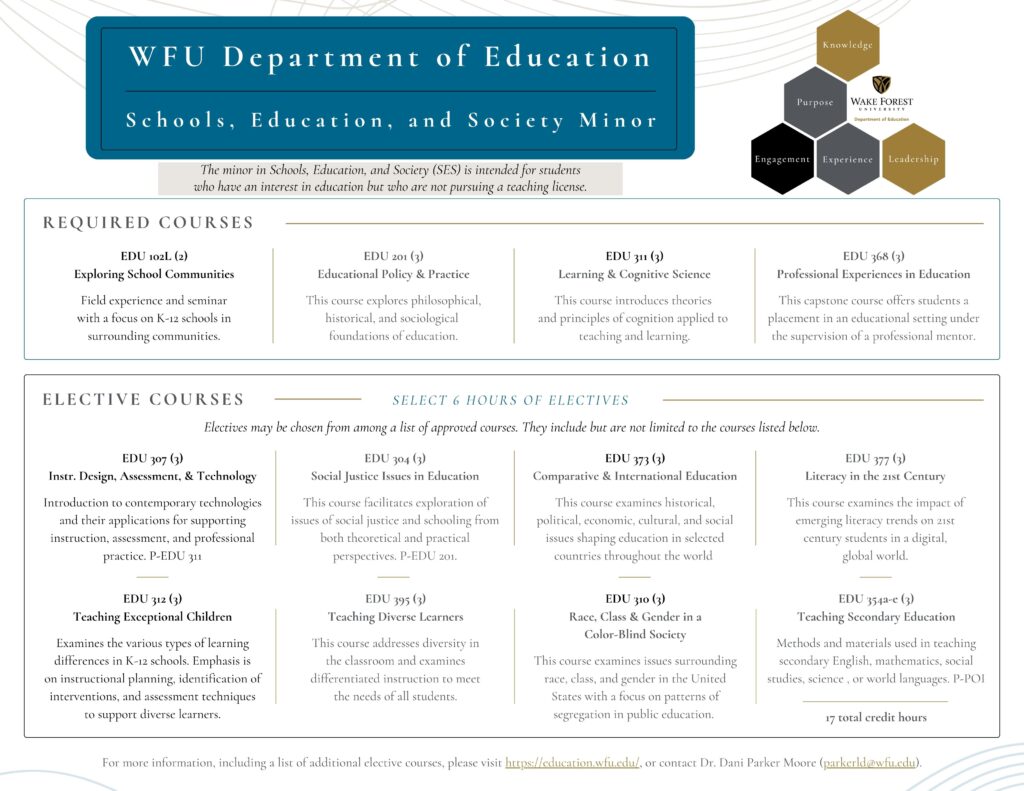Schools, Education, & Society (SES) Minor
The 17-hour minor in Schools, Education, & Society (SES) is intended for students who have an interest in education but who are not pursuing licensure or non-licensure pathways in elementary or secondary education.
Students in the SES minor come from majors across the Wake Forest campus, including but not limited to Anthropology, Biology, Communication, Computer Science, Economics, English, Health & Exercise Science, History, Mathematics, Politics & International Affairs, Psychology, Religion, Sociology, and Spanish.
All Wake Forest students are invited to consider how the SES minor might connect with their personal and professional interests.

Required Courses in the Minor
The following four courses are required for the SES minor.
- EDU 102L – Exploring School Communities. (2 h). Field experience and seminar with a focus on K-12 schools in surrounding communities. Pass/Fail only.
- EDU 201 – Education Policy and Practice. (3 h). Philosophical, historical and sociological foundations of education, including analysis of contemporary accountability systems. (CD, D)
- EDU 311 – Learning and Cognitive Science. (3 h). Theories and principles of cognition applied to teaching and learning. (CD, D)
- EDU 368 – Professional Experiences in Education. (3 h). This course offers students a placement in an educational setting under the supervision of a professional mentor. During this internship, student examine a critical topic in a local school, a community agency, a non-profit organization, or other educational setting. P-minimum GPA of 2.7 and POI.
Elective Courses in the Minor
Students are required to complete at least two elective courses (6 credit hours). Electives may be chosen from among a list of approved courses. They include but are not limited to the courses listed below.
| EDU 221 | Children’s Literature | |
| EDU 222 | Integrating the Arts and Movement into the School Curriculum | |
| EDU 231 | Adolescent Literature | |
| EDU 236 | Creativity, Innovation, and Entrepreneurial Thinking in Education | |
| EDU 304 | Social Justice Issues in Education | |
| EDU 305 | The Sociology of Education | |
| EDU 307 | Instructional Design, Assessment, and Technology | |
| EDU 308 | School and Society | |
| EDU 310 | Race, Class, and Gender in a Color-blind Society | |
| EDU 312 | Teaching Exceptional Children | |
| EDU 321 | Advanced Issues and Trends in Education | |
| EDU 330 | Fathers and Daughters | |
| EDU 351 | Adolescent Psychology | |
| EDU 354 | Content Pedagogy | |
| EDU 357 | Crisis in Higher Education | |
| EDU 358 | Leadership and Assessment in K-12 Schools | |
| EDU 359 | Model of Experiential Learning | |
| EDU 373 | Comparative and International Education | |
| EDU 377 | Literacy in the 21st Century | |
| EDU 381 | Teaching Students with Special Needs | |
| EDU 388 | How We Learn to Write | |
| EDU 395 | Teaching Diverse Learners | |
| ANT 353 | Language in Education | |
| LIN 337 | TESOL Linguistics | |
| THE 270 | Theatre in Education |
For More Information
For general inquiries, please contact Dr. Dani Parker Moore,
SES Minor Program Director
